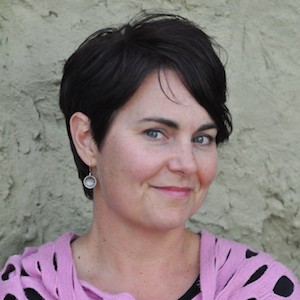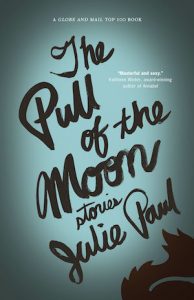10 Questions with Canadian Author Julie Paul

We first met Canadian short story writer and poet Julie Paul in early 2014, back when Compose was still in its infancy. At that time we were delighted to publish an excerpt from Julie’s short story collection The Jealousy Bone (Emdash Publishing, 2008).
We adored Julie from the first time we read “Instant Family“—adored her from its very first line:
“When Lovey found out that I activated our baby without her, she was pretty choked.”
Since we last connected, Julie Paul has authored a second short story collection, The Pull of the Moon (Brindle & Glass, 2014), as well as a poetry collection, The Rules of the Kingdom (MQUP, 2017). The Pull of the Moon was awarded both an IPPY award and the Victoria Book Prize and was named a Top 100 Book in the Globe and Mail.
Julie’s work has also appeared in The Dalhousie Review, The Fiddlehead, Event, PRISM International, Geist, and others. Her essay “It Not Only Rises, It Shines” won the Edna Staebler Personal Essay Award from The New Quarterly, and her story “The Expansion” won The Rusty Toque’s 2016 Chapbook Award.
For our tenth issue we wanted to reconnect with Julie, especially with regard to The Pull of the Moon, and pick her brain a little over her writing process, her characters, and her favourite short stories.
You can also read her short story “The King Is Dead,” excerpted from The Pull of the Moon, in this issue.
Neighbours feature prominently as characters in several of the stories in The Pull of the Moon. Did you plan this connection to give the collection a sense of coherence, or did this happen organically?
This definitely was an organic occurrence, but I do tend to be inspired by the people around me—sometimes literally beyond the wall I’m up against. Stories rise up when beings relate, whether that’s to talk, fight, love or put up a fence. Right now I have excellent neighbours, and I’m quite relieved, but that might not last. I’ll try to think of that as a positive, i.e. story-generating, if it comes to that. What I was hoping for when I put these particular stories together as a collection was an exploration of the human quirks and behaviours that often defy logic or sense—whether that’s acting from the heart or from a more animal instinct. The people closest to us—including neighbours—most often bring those behaviours to light.
The conflict in the story “Black Forest” culminates with a striking symbolic image. What’s your process for creating depth in your stories? Do you reread early drafts looking for opportunities to add symbolism and metaphor, or do you begin with an image or metaphor and build the story around it?
Thanks for the wonderful feedback on that ending. I remember having to rewrite this story’s ending numerous times, although the image you’re talking about was there early on. Depth is a hard one to trace; I think that for me, it begins when I go beyond the surface, beyond what characters are wearing or where they’ve come from, to a place of action. There can be a tendency in short fiction to stay quiet and internal, or present a string of observations, but until characters move and act, and interact, there isn’t much story going on. Readers tend to like it when something happens.
As far as symbolism and metaphor go, once I become aware that I’m trying to insert them as I write early drafts, or think about theme too much, the story tends to flop. During the rewrites is a much better time to find these and perhaps tease out their presence a little more.
As I was reading The Pull of the Moon I came across a story called “Crossing Over,” which I immediately recognized. Before your collection was published, you sent us an earlier version of this piece. Can you tell us about the evolution of this story?
This story began as a light, humorous anecdote about cross-border relationships and people going to extreme lengths for their pets. It gradually turned into more of a story about grief and loss and the struggles we have to be ourselves with family members. I’ve read it to audiences who laugh, and others who are teary. I’m glad to see it bring emotions out!
After publishing two collections of short stories, you recently also published a collection of poetry: The Rules of the Kingdom (McGill-Queen’s University Press). Is your process for writing poetry similar to or different from writing short stories?
I began writing poetry as a teen, so I’ve been working at that genre the longest. I do write both concurrently; in fact, I write CNF too, as well as novels, and I tend to jump around. Although lately the novel has been taking over, being a much bigger, all-consuming beast. The process for poetry is similar to that for short stories, in that they both begin with an initial jolt to attention. Fiction is more likely to begin with a line of dialogue or a character I see or imagine, while poetry often springs from a small seed of sensory detail.
Many of your stories though literary in quality are also page-turners. There’s plenty of intriguing conflict—some suspenseful and mysterious, some quite funny, and some emotionally engaging. Do your first notions of a story usually stem from character or conflict, or some combination of both?
I’d say that the combo of character and problem is where stories more often begin; sometimes a real, live person is the model to begin with, and then imagination quickly makes them into a made-up character. I ask the question “What if?” a lot, especially when I’m stuck in the writing process, and usually the characters reveal themselves by doing or saying or thinking something I wasn’t expecting.
The story “Her Full Name Was Beatrice” feels a little more experimental than the others in a way that makes me wonder if it originated from a writing prompt or exercise. Any truth to this? Either way, what role do writing exercises and “practice” play in your process?
That story was the hardest story in the book for me to write, through and through. I tried so many ways into it, draft after draft, changing points of view, voices, tenses, and it didn’t start working until I put it into second person. I think this POV is good for giving a little distance; or at least that’s how it worked in this case.
I was letting myself get in the way too much, being too judgmental, moralistic—because this story sprang from a real incident close to home. Someone in the community killed her child, when the child was the same age as my own daughter, and I was deeply affected by this. It took years for me to be able to make it into fiction—and the story in the book is fiction. But the emotions within the story are quite real, and in the end, writing it was a helpful outlet.
I write nearly every day from a one-word prompt, my own word or one given to me by one or two writing friends via email, and this has been the foundation of my writing practice for years. It’s a life line, truly. Exercises and constraints such as this can be very helpful, especially if you only have a short amount of time in which to write.
Writers often say that endings are the hardest part of writing a short story. Your endings in The Pull of the Moon generally come to satisfying but not neatly tied up conclusions, and some leave a fair amount to the reader’s interpretation. “Flip,” on the other hand, concludes with a happy ending, which works refreshingly well. How do you decide where and how to end your short stories?
It was so liberating to include a happy ending in this collection! Can Lit isn’t exactly a cheery genre most of the time.
It’s a tough question, about endings. Often it happens naturally, other times it’s more of a conscious act (and struggle), to come up with either an image or action that reflects the body of the story without being reductive or obvious.
Someone smart once said an ending should feel or sound like a bell ringing. Someone else said it should be an inevitable surprise. I think of these things when I revise my stories’ endings and hope I get close.
The characters, conflict and pacing in “The King Is Dead” feel like they could potentially occupy the space of a novel, yet you’ve beautifully condensed the nuances of a family and its history into a story that can be read in one sitting. Did you at any time consider yourself to be working toward a novel with this material? How did you go about managing so much story with limited space?
This particular story never veered over into novel territory for me, but others have. Alice Munro’s stories have been hugely influential and inspiring, and I try to remember, when I’m working with big backstories and situations, that she manages to fit multiple generations into one story! Something to aspire to, indeed.
There were many versions of this story, and I worked closely with my editor Holley Rubinsky on this one before we were both satisfied with it—a testament to the power of another reader, who pushes the writer to go further, deeper, into the work.
Your writing has been published in some of Canada’s most prominent literary magazines. Any words of wisdom for writers struggling to find a home for their work?
Doing the research into where your stories might be most welcome is a good idea. There are so many magazines out there, online and in print, and it can be overwhelming, trying to figure it all out. The process of editing, formatting, and submitting written work is something that doesn’t come naturally to most writers, but it’s a necessary “evil” if you want to see your work out there in the world. As a former lit mag editor, I’d say the best advice would be to know the market and the formatting requested, send a polished piece of writing with no typos, spelling mistakes or missing pages (!) and be patient. Oh, and send simultaneously. Life is far too short to send to one place only and wait for a response before sending the same piece out again.
In honour of our tenth issue, what are your top ten favourite short stories—the ones you’ve read multiple times, the ones you’ve found the most influential in your own writing, or the ones you think every fiction writer should read?
- “The Beggar Maid,” from Who Do You Think You Are?, by Alice Munro
- “Why Don’t You Dance?” or “Cathedral,” from Where I’m Calling From, by Raymond Carver
- “The Semplica Girl Diaries,” from Tenth of December, by George Saunders
- “Rara Avis,” from Greasy Lake and Other Stories, by T. C. Boyle
- “People Like That are the Only People Here,” from Birds of America, by Lorrie Moore
- “A Good Man is Hard to Find,” from A Good Man Is Hard to Find and Other Stories, by Flannery O’Connor
- “The Brown Coast,” from Everything Ravaged, Everything Burned, by Wells Tower
- “Loulou” or “The Domestic Life of the Language,” from Bluebeard’s Egg, by Margaret Atwood
- “Can You Wave Bye Bye, Baby?” from the collection of the same name, by Elyse Gasco
- “Boys,” from Demonology, by Rick Moody
You can learn more about Julie Paul on her website, juliepaul.ca.











